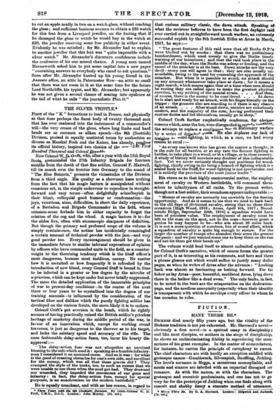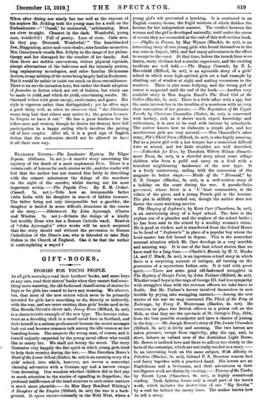FICTION.
MANY THERE BE. • DICKENS died nearly fifty years ago, but the vitality of the Dickens tradition is not yet exhausted. Mr. Sherrard's novel— obviously a first novel—is a spirited essay in discipleship ; and like most disciples, or authors in the stage of discipleship, he shows an undiscriminating fidelity in reproducing the man• nerisms of his great exemplar. In the matter of nomenclature, for instance, ho carries the principle of cacophony to excess. The chief characters are with hardly an exception saddled with grotesque names—Gunithwack, Silverspink, Snuffling, Jickling. The hero's surname is Meggs, a monstrous monosyllable, and saints and sinners are labelled with an impartial disregard .or romance. As with the names, so with the characters. The grotesque and eccentric predominate, and one has not to go very far for the prototype of Jickling when one finds along with conceit and shabby finery a staccato method of utteranee.
When after dining not wisely but too well at the expense of his nephew Mr. Jickling took the young man for a walk on the Embankment—" ' Grand,' ho murmured, ' exhilarating. Must Bee river to-night. Cleanest in the dark. Wonderful, young man, wonderful ! Full of poetry. Lure of river. Calls men. In they pop. Drowned. Wonderful' " The hunchbacked Yew, Haggenhop, miser and curio-dealer, stirs familiar memories. Mrs. Gtuuthwack recalls Mrs. Jellyby in the range of her philanthropy and her disregard for the comfort of her family. And then there are sudden conversions, violent physical reprisals, abrupt alternations of the ludicrous and the intensely serious, long explanatory monologues, and other familiar Dickensian devices, to say nothing of the scene being largely laid in Rochester. But it would be unfair to insist too much on these resemblances. There is no servile imitation here, but rather the frank adoption of formulae in fiction which are out of fashion, but which can be made to yield, and which do yield, entertaining results. Mr. Sherrard writes with great energy, exuberance, and gusto. His style is vigorous rather than distinguished ; yet he often says a good thing well, as when he observes that " the dilettante wears long hair that others may notice it ; the genius because he forgets to have it cut." He has a great kindness for his fellow-men and women; though he denies his dreamy hero full participation in a happy ending Which involves the pairing off of four couples. After all, it is a. good sign of English fiction that the modernists should not be allowed to have it all their own way.
READABLE Novers.—The Loudwater Mystery. By Edgar Jepson. (Odhams. 7s. net.)—A murder story concerning the mystery of the death of a most unpleasant Peer. There is a certain code of honour for such stories as thi-, and the reader will feel that the author has not treated him fairly in describing with the utmost minuteness the doings of the murderer on the night of the murder, whilst leaving out his most important action.—The Pagoda Tree. By B. M. Croker. (Cassell. 7s. net.)—Tells how an irresponsible father visits India with his daughter in search of hidden treasure. The father being not only irresponsible but a gambler, the daughter is landed in some difficult situations in the course of the story.—Abbotscourt. By John Ayscough. (Chatto and Windus. 7s. net.)—Relates the doings of a kindly but worldly Dean who has a Roman Catholic ward. Readers of "John Ayscough's" other works will be much surprised that the story should end without the perversion to Roman Catholicism of the Dean's son, who is intended to take Holy Orders in the Church of England. Can it be that the author is contemplating a sequel ?



















































 Previous page
Previous page